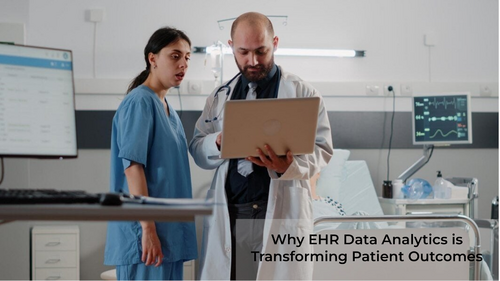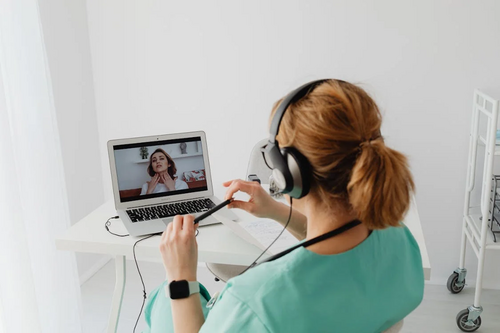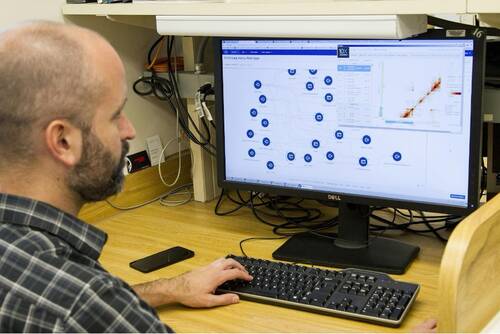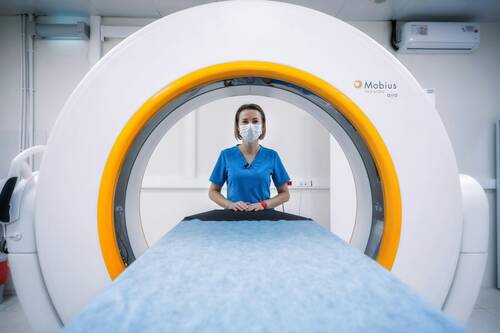Aside from patient care on an individual basis, EHR data analytics also revolutionizes population health management. Through the review of...
Addressing Healthcare Inequality Through Technology
Stress Management for Healthcare Workers
 The nursing profession, renowned for its demanding nature, requires healthcare professionals to perform consistently at high levels of considerable stress. Nurses and other healthcare workers encounter numerous psychological and physical challenges daily, ranging from long shifts to emotionally charged patient interactions. Developing simple yet effective habits can significantly impact nurses' ability to manage stress, maintain optimal health, and deliver exceptional patient care.
The nursing profession, renowned for its demanding nature, requires healthcare professionals to perform consistently at high levels of considerable stress. Nurses and other healthcare workers encounter numerous psychological and physical challenges daily, ranging from long shifts to emotionally charged patient interactions. Developing simple yet effective habits can significantly impact nurses' ability to manage stress, maintain optimal health, and deliver exceptional patient care.
The Importance of Healthier Habits in Nursing
Healthcare environments frequently test the resilience and mental stamina of nurses. According to recent research from the American Nurses Association, nearly 70% of nurses report experiencing chronic workplace stress, contributing to burnout, decreased job satisfaction, and compromised patient care quality. Addressing this widespread issue through proactive health management habits is essential for sustaining both personal well-being and professional performance. (more…)How Technology Is Transforming Healthcare Careers
The Rise of the Machines? How Automation Is Reshaping Traditional Roles
Automation is changing the landscape, impacting tasks previously considered exclusively human. As a result, many healthcare jobs are in danger of going extinct. How are roles adapting?The Digitalization of Healthcare Administration
Gone are the days of endless paper files and manual data entry. Electronic Health Records (EHRs) are now standard, streamlining workflows and making patient information readily accessible. This shift requires healthcare administrators to be tech-savvy, adept at managing digital systems and ensuring data security. Skills like data analysis and cybersecurity are now highly valued in administrative roles. Tasks like scheduling, billing, and insurance claims are increasingly automated, freeing up staff to focus on patient interaction and complex problem-solving. (more…)Organ-on-a-Chip Technology: A Revolution in Drug Testing
Organ-on-a-chip technology represents one of the most promising breakthroughs in healthcare. This innovation involves creating miniature, lab-grown models of human organs that mimic their functions on a microchip. These "organs" can be used to test new drugs and treatments in a much more accurate and ethical way than traditional animal testing. By using human cells to create organ models, scientists can simulate the way drugs interact with human tissue, providing valuable insights into the efficacy and safety of new treatments. This technology is particularly helpful in the early stages of drug development, potentially reducing the high failure rate of clinical trials and accelerating the process of bringing new therapies to market. As healthcare continues to evolve, innovative treatments like peptide therapy are gaining attention for their potential to improve overall wellness and address a variety of health issues. Clinics such as BlissMD are at the forefront of offering these cutting-edge therapies, helping patients access personalized treatments designed to enhance healing and vitality. (more…)Bridging the Gap Between Big Data and Healthcare: The Role of AI in Medical Research
In the near future, AI-driven tools may even personalize treatment recommendations based on real-time patient monitoring, optimizing care for individuals...
The Role of Startups in Shaping Future Health Care Markets
Perhaps one of the most significant contributions of startups is their ability to inspire others. Stories of small ventures growing...
Navigating Legal Compliance: Why Healthcare Businesses Must Understand Business Law
Compliance with Healthcare-Specific Regulations
Healthcare is one of the most heavily regulated industries, and for good reason. The stakes are high, with patient safety, privacy, and well-being on the line. Regulations such as the Health Insurance Portability and Accountability Act (HIPAA), the Occupational Safety and Health Administration (OSHA) standards, and the Anti-Kickback Statute are designed to protect patients, employees, and the integrity of the healthcare system. However, these regulations can be complex and challenging to navigate, especially for businesses without dedicated legal expertise. Noncompliance can have severe consequences. Fines for HIPAA violations, for example, can range from thousands to millions of dollars, depending on the severity of the breach. Similarly, failing to meet OSHA standards can result in hefty penalties and even shutdowns. Beyond financial costs, legal violations can damage a healthcare business’s reputation, eroding patient trust and making it harder to attract and retain clients. By understanding and adhering to these regulations, healthcare businesses can avoid these pitfalls and build a foundation of trust and reliability. (more…)Why Demand Is Rising
With an aging population comes a population with increasing healthcare needs. As life expectancy rises, more people require support, whether it’s to manage chronic medical conditions, home care, or rehabilitation services. Diseases like heart disease, diabetes, and arthritis are also on the rise, and these require ongoing monitoring outside of emergency settings. There is also a growing emphasis on preventative healthcare too. Early intervention and wellness rehabilitation are aimed at reducing hospital admissions and improving health outcomes. However, there is also a shortage of healthcare workers, and non-emergency professionals are used to bridge gaps to ensure patients are cared for and looked after while they’re on waiting lists. (more…)Healthcare workers dedicate their lives to helping others, but that doesn’t mean they should ignore their own financial well-being. Achieving...
Groundbreaking Software Development for Healthcare
The business is facilitating a new age of care delivery by assisting healthcare professionals in switching from antiquated practices to...
Adapting to Global Trends for a Thriving Career in Healthcare
8 Key Skills Every Healthcare Professional Should Develop
1. Strong Communication Skills
Communication lies at the heart of healthcare. Professionals must clearly and effectively exchange information with patients, families, and colleagues. This includes both verbal and nonverbal communication. For instance, explaining a medical condition or procedure to a patient requires clear, simple language, while empathy and active listening help build trust. Good communication is also essential when collaborating with a team. Healthcare professionals work closely with nurses, doctors, technicians, and administrative staff. Miscommunication can lead to mistakes, so being able to convey information accurately and in a timely manner is critical for patient safety and effective teamwork. (more…)How AI is Streamlining Hospital Operations for Better Patient Outcomes
AI: The Backbone of Modern Hospital Operations
“Artificial intelligence in hospitals goes beyond robotic surgeries or AI-assisted diagnostics. It forms the backbone of operational efficiency, addressing challenges like overcrowding, miscommunication, and inefficiencies in resource allocation. By leveraging advanced machine learning algorithms, AI systems analyze vast amounts of data, identify patterns, and recommend actionable solutions,” shares Tiffany Payne, Head of Content at PharmacyOnline.co.uk For example, hospitals can now predict patient admission rates using historical data, seasonal trends, and real-time analytics. This allows administrators to allocate resources—like beds, staff, and equipment—more effectively, ensuring patients receive timely care. AI-driven operational systems also reduce the cognitive load on healthcare staff by automating routine decision-making. This frees up doctors, nurses, and administrators to focus on more complex tasks, ultimately enhancing the quality of care provided. (more…)Creating Educational Content for Patients: A Guide to Effective Healthcare Storytelling
Why Medical Bills Are Often a Surprise
Medical billing in the U.S. can be complex and opaque. Even with insurance, out-of-pocket costs can catch patients off guard. Common reasons for surprise bills include:- Out-of-Network Providers: Even during planned procedures, patients may unknowingly receive care from out-of-network specialists, resulting in much higher costs.
- High Deductibles: Many insurance plans come with deductibles that must be met before coverage kicks in, leaving patients to cover significant costs upfront.
- Ambulance Services: Emergency transportation is often not fully covered, leading to bills that average hundreds or even thousands of dollars.
- Hidden Fees: Charges for tests, medications, or consultations may not be clearly communicated beforehand.
- Self-care Should be a Top Priority
10 Ways to Kickstart Your Career in Healthcare Leadership
- Understand the Role of Healthcare Leaders
Preparing for a Career Shift: Transitioning into Nursing
Reducing Overwhelm in Clinics – 6 Helpful Suggestions
- Hire a Virtual Medical Admin Assistant
What Exactly Does a Laboratory Information System Do?
Think of a Laboratory Information System as the digital backbone of a lab. It’s software designed to handle everything from the moment a sample arrives to when the final report is sent out. It tracks samples, organizes workflows, ensures quality control, and even helps with compliance. For pathology labs, where precision is paramount, an LIS is like having an extra layer of security and efficiency. Let’s break it down. Imagine a busy pathology lab receiving dozens (or even hundreds) of patient samples in a single day. Each sample needs to be labeled, processed, and analyzed. Without a system in place, it’s easy for things to get chaotic. An LIS makes sure every sample is accounted for, every result is documented, and everything runs like a well-oiled machine. (more…)Nine Steps You Can Take to Prevent Diseases
In embracing technology, research facilities position themselves at the forefront of scientific progress. These innovations empower researchers to push beyond...






























